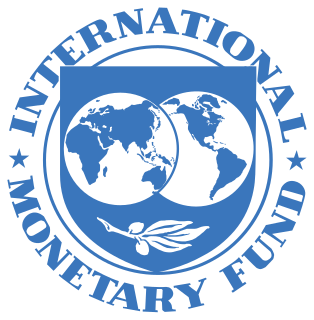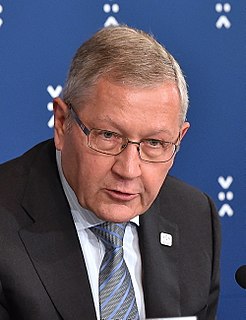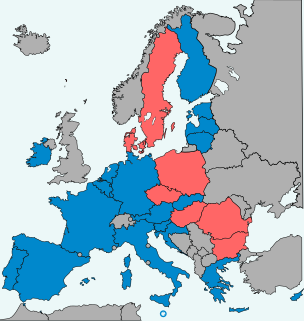Related Research Articles

The International Monetary Fund (IMF) is an international financial institution,headquartered in Washington,D.C.,consisting of 190 countries. Its stated mission is "working to foster global monetary cooperation,secure financial stability,facilitate international trade,promote high employment and sustainable economic growth,and reduce poverty around the world." Formed in 1944,started on 27 December 1945,at the Bretton Woods Conference primarily by the ideas of Harry Dexter White and John Maynard Keynes,it came into formal existence in 1945 with 29 member countries and the goal of reconstructing the international monetary system. It now plays a central role in the management of balance of payments difficulties and international financial crises. Countries contribute funds to a pool through a quota system from which countries experiencing balance of payments problems can borrow money. As of 2016,the fund had XDR 477 billion.

The Oesterreichische Nationalbank (OeNB) is the central bank of Austria and,as such,an integral part of both the European System of Central Banks (ESCB) and the Eurozone. In the public interest,the Oesterreichische Nationalbank contributes to monetary and economic policy decision-making in Austria and in the Euro area. In line with the Federal Act on the Oesterreichische Nationalbank,the OeNB is a stock corporation. Given its status as a central bank,it is,however,governed by a number of special provisions,as laid down in the Nationalbank Act. The OeNB's capital totals €12 million and is held by a sole shareholder,the federal government. The shareholder rights of the federal government are exercised by the Minister of Finance. Since May 2010,this capital is entirely held by the Austrian state. Previously half of the capital was in the hands of employer and employee organizations as well as banks and insurance corporations.

Ewald Nowotny is an Austrian economist and social democratic politician and former governor of Austria's central bank Oesterreichische Nationalbank. He was also a member of the European Central Bank’s governing council.

Christian Noyer is a French economist who served as Governor of the Bank of France from 2003 to 2015. In this capacity,he chaired the Bank for International Settlements from 2010 until 2015. He had previously served as the first Vice-President of the European Central Bank from 1998 to 2002.

Christine Madeleine Odette Lagarde is a French politician,economist and lawyer who has been President of the European Central Bank (ECB) since 1 November 2019. She previously served as Chair and Managing Director of the International Monetary Fund (IMF) from 2011 until 2019. Lagarde also held various senior ministerial posts in the Government of France,most prominent as Minister of the Economy,Finance and Industry from 2007 to 2011. She was the first woman to hold each of those posts.

Peter Löscher is an Austrian manager who was the CEO of Siemens from 2007 until 2013. As of 2017,Löscher remains as the only CEO to be hired from outside the conglomerate in the 170-year history of Siemens. Before joining Siemens,he worked as president for Global Human Health at global pharmaceutical company Merck &Co.

The European Financial Stability Facility (EFSF) is a special purpose vehicle financed by members of the eurozone to address the European sovereign-debt crisis. It was agreed by the Council of the European Union on 9 May 2010,with the objective of preserving financial stability in Europe by providing financial assistance to eurozone states in economic difficulty. The Facility's headquarters are in Luxembourg City,as are those of the European Stability Mechanism. Treasury management services and administrative support are provided to the Facility by the European Investment Bank through a service level contract. Since the establishment of the European Stability Mechanism,the activities of the EFSF are carried out by the ESM.

Klaus P. Regling is a German economist and current Chief Executive Officer of the European Financial Stability Facility (EFSF) and Managing Director of the European Stability Mechanism. Regling was reportedly considered as a possible head of the European Central Bank to succeed Jean Claude Trichet.

The European Stability Mechanism (ESM) is an intergovernmental organization located in Luxembourg City,which operates under public international law for all eurozone Member States having ratified a special ESM intergovernmental treaty. It was established on 27 September 2012 as a permanent firewall for the eurozone,to safeguard and provide instant access to financial assistance programmes for member states of the eurozone in financial difficulty,with a maximum lending capacity of €500 billion.

Peter Praet is a Belgian economist who served as a member of the Executive Board of the European Central Bank from 2011 to 2019 and concurrently in not statutory position of ECB chief economist since 2012.
Claudia Maria Buch is a German economist who currently serves as Vice President of the Bundesbank. She previously worked as professor at the University of Tübingen and served as a member of the German Council of Economic Experts. Buch worked as scientific director at the Institut für Angewandte Wirtschaftsforschung in Tübingen and as chairperson of the economic council at the Federal Ministry of Economics and Technology. She still teaches at the Otto-von-Guericke-Universität Magdeburg. Her research focuses on regulation and supervision of banking.
Harris Georgiades is a Greek Cypriot economist and politician. He was pivotal in the successful implementation of the economic reform plan for Cyprus and its successful conclusion in 2016.

Sabine Lautenschläger is a German jurist who previously served as a member of the executive board of the European Central Bank. She was formerly vice-president of the Deutsche Bundesbank. Lautenschläger graduated with a Staatsexamen from the University of Bonn in 1990.
The banking union of the European Union is the transfer of responsibility for banking policy from the national to the EU level in several EU member states,initiated in 2012 as a response to the Eurozone crisis. The motivation for banking union was the fragility of numerous banks in the Eurozone,and the identification of vicious circle between credit conditions for these banks and the sovereign credit of their respective home countries. In several countries,private debts arising from a property bubble were transferred to sovereign debt as a result of banking system bailouts and government responses to slowing economies post-bubble. Conversely,weakness in sovereign credit resulted in deterioration of the balance sheet position of the banking sector,not least because of high domestic sovereign exposures of the banks.

Robert Holzmann is an Austrian economist1 and the current Governor of Austria’s central bank,the Oesterreichische Nationalbank (OeNB).2,3 His term of appointment runs from September 1,2019,to August 31,2025.

The 2010 Bilderberg Conference took place June 3–6 in Sitges,Spain at Hotel Dolce.

Hans Jörg Schelling is an Austrian entrepreneur and politician of the Austrian People's Party and who served as Minister of Finance of Austria in the governments of chancellors Werner Faymann and Christian Kern.

Mário JoséGomes de Freitas Centeno is a Portuguese economist,university professor,and politician. Since 2015,he has been Minister of Finance in the government of Prime Minister António Costa of Portugal. He was the president of the Eurogroup and chairman of the board of Governors of the European Stability Mechanism from 2018 to 2020. Previously,he was a board member economist of the Bank of Portugal. On 9 June 2020,he announced his resignation from the Ministry of Finance,effective 15 June.

Nadia María Calviño Santamaría is a Spanish economist and civil servant who serves as First Deputy Prime Minister of Spain since July 2021 and as Minister of Economy since 2018 under prime minister Pedro Sánchez. In 2020,her portfolio was renamed as Minister for Economic Affairs and Digital Transformation.
Helmut Ettl is an Austrian economist and European banking and finance specialist.
References
- ↑ "Gertrude Tumpel-Gugerell". European Central Bank. Archived from the original on 16 October 2010. Retrieved 28 October 2010.
- ↑ Christopher Spink (September 7, 2016), ESM appoints Tumpel-Gugerell as independent assessor Reuters .
- ↑ Expert group on a debt redemption fund and eurobills European Commission.
- ↑ Christopher Spink (September 7, 2016), ESM appoints Tumpel-Gugerell as independent assessor Reuters .
- ↑ Jan Strupczewski (June 15, 2017), Euro zone bailout fund has done well, might still improve, evaluation shows Reuters .
- ↑ IMF Managing Director Christine Lagarde Names External Advisory Groups for the 2020 Comprehensive Surveillance Review International Monetary Fund (IMF), press release of October 30, 2018.
- ↑ Michael Shields (January 7, 2013), Nowotny set for new term atop Austrian cenbank -sources Reuters .
- ↑ Shadia Nasralla (May 19, 2015), OMV names packaging group Mondi manager as new chairman Reuters .
- ↑ Board of Directors International Women's Forum (IWF).